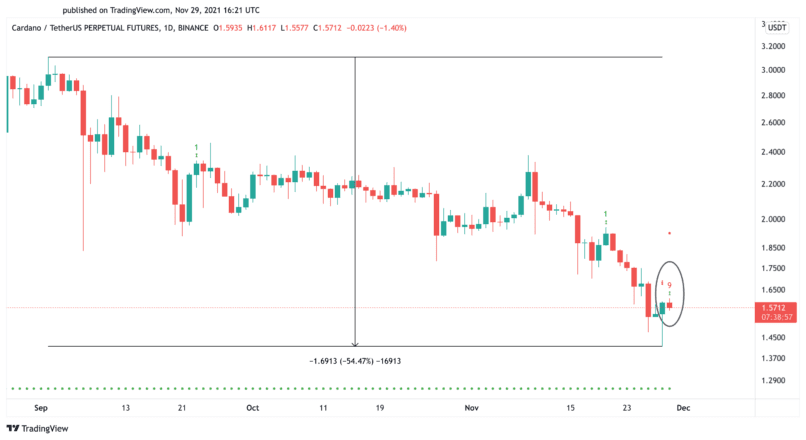
Shutterstock cover by AlekseyIvanov.
Cardano Hits Local Bottom, Targets $1.80
Cardano appears to be bottoming out after losing more than half of its market value.
Cardano may be poised to rebound as it reached a significant demand wall. If buy orders begin to pile up, ADA might have the strength to resume its uptrend.
Cardano Flashes Buy Signal
Cardano appears to have hit a local bottom after plummeting nearly 55% from a record high of about $3.10 set in early September.
The sixth-largest cryptocurrency by market cap entered a steep correction shortly after recording a new all-time high. It appears that investors took advantage of the milestone to book profits, adding fuel to the retracement.
Now that Cardano has dropped to a four-month low of $1.41, the downtrend could be about to reach exhaustion.
The Tom DeMark (TD) Sequential indicator has presented a buy signal on ADA’s daily chart. The bullish formation developed as a red nine candlestick, which is indicative of a one to four daily candlesticks upswing or the beginning of a new upward countdown.
Transaction history shows that a spike in buying pressure could push Cardano towards $1.80. But first, the smart-contracts token must slice through the $1.60 resistance level. IntoTheBlock’s IOMAP model shows that over 93,000 addresses have previously purchased more than 2 billion ADA around this price level, making it a tough nut to crack.
Only a decisive daily candlestick close above $1.60 would lend credence to the optimistic outlook presented by the TD setup.

On the other hand, the IOMAP cohorts show that nearly 128,000 addresses hold over 2.8 billion ADA between $1.48 and $1.53. Breaching such a significant demand wall could put Cardano at risk of a steeper correction, invalidating the bullish thesis.
If this were to happen, prices could likely dive to $1.25 or even $1.
Disclosure: At the time of writing, the author of this feature owned BTC and ETH.
